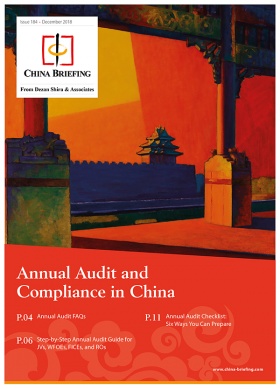Shanghai Businesses to Comply with New Waste Management Norms from July 1
Starting July 1, 2019, Shanghai will make garbage sorting mandatory and restrict the use of disposable items in the hospitality and e-commerce industries.
Shanghai will welcome its new waste management regulations, which is set to transform the way waste is collected and places new restrictions upon the waste output of businesses.
This will be one of the most significant overhauls of waste management adopted by any Chinese municipal government since China declared its war on pollution in 2014.
Announced earlier this year, Shanghai’s Mayor Ying Yong stated that the functions of the new waste management regulations are threefold – to introduce a new garbage classification system; restrict business’ use of disposable items; and spearhead the construction of 10 new recycling centers in Shanghai by the end of 2019.
Currently, Shanghai is home to more than 24 million residents, and produces approximately 26,000 tons of garbage per day.
For this reason, the sweeping changes are poised to have a significant environmental impact on not just the city itself but also the Yangtze River Delta Region more broadly.
It is expected that if these new measures find success in Shanghai, similar regulations will be emulated across other cities in China in order for the country to reach its goal of ‘35 percent recycling in 46 cities by 2020‘.
Less than one week until this law comes into force, all eyes are on Shanghai to see how the city will prepare for and implement these changes and whether it will indeed transform the production and collection of waste in the city.
What do the regulations cover?
The Shanghai Domestic Waste Regulations (Shanghai Municipal People’s Congress Standing Committee Announcement No. 11) has two overarching goals.
Firstly, it seeks to clearly separate waste for a more effective recycling process.
Secondly, it will place tighter restrictions on the waste output of businesses and government departments.
Household and business waste collection
Shanghai will adopt a new garbage classification system, shifting from the two traditional categories – recycling and other waste – to a more comprehensive four-tier classification system, which will sort out waste into: recyclable waste, hazardous waste, residual waste, and kitchen waste.
According to the regulations, waste will be classified as follows:
- Recyclables: Paper, plastic, glass, scrap metal, fabrics;
- Hazardous: Batteries, light tubes, medicines, paint and its containers;
- Kitchen: Food leftovers, expired food, fruit peels and cores, plants, and TCM herbs; and
- Residual: All other waste that does not fall in any of the categories above.
Individuals can be fined RMB 200 (US$29) for failing to sort their waste properly, while companies and institutions can be fined as much as RMB 50,000 (US$7,272) (up from the previous maximum fine of RMB 5,000 (US$727)).
In addition, waste transporters are directed to use separate and clearly identified vehicles for each individual type of waste and can refuse to pick up trash if a bin is not properly sorted.
The Shanghai Municipal Government has already begun installing the new bins in residential compounds.
The new regulations also propose that a domestic garbage disposal fee system be gradually implemented – for measuring charges and classified pricing.
Disposable items restricted in businesses and government departments
Starting July 1, businesses and government departments will be restricted in their use of disposable items.
Under the new regulations, hotels should not provide disposable slippers and shower caps, unless requested by the patron.
Similar restrictions are being put in place for delivery industries.
In addition, government and public institutions will also be subject to tighter restrictions. They will no longer be allowed to use disposable cups in the office and must prioritize products made from recycled materials for their internal stock.
Food delivery businesses must also provide disposable utensils only when requested, while courier companies should actively encourage customers to use environmentally friendly packaging and electronic receipts where possible.
More generally, businesses are directed to abide by state regulations on cleaner production, which means giving priority to materials and design schemes that are easy to recycle, easy to disassemble, easy to degrade, non-toxic, and harmless.
Moreover, under the new waste classification system, all offices, manufacturers, government bodies, enterprises and institutions, and social organizations will be provided with the four types of collection containers.
Waste management in China
China has confronted the challenge of upgrading its waste management system for many years now.
In the last five years, the central government has introduced numerous pilot programs and national targets aimed at streamlining and enhancing waste collection efforts across the country.
During this period, many of China’s major cities, such as Shanghai, Guangzhou (Guangdong province), Beijing, and Hangzhou (Zhejiang province) have passed waste management regulations in an attempt to achieve the ’35 percent recycling by 2020′ goal.
In Beijing’s Tongzhou district, for example, mandatory garbage sorting has been adopted by public institutions and more than 2,500 restaurants.
Besides the major cities, Hainan province recently announced that it will introduce a ban on non-biodegradable plastic bags and eating utensils by the end of 2020 and will ban the use of single-use non-biodegradable plastic completely before 2025.
Prepare for compliance
The latest changes proposed by the Shanghai government will be the most comprehensive waste management regulations to be applied on such a scale anywhere in China and will affect businesses and consumers alike.
The new regulations themselves do not come without challenges – key concerns are how they will be effectively enforced and who will be monitoring compliance. Further, according to a survey last year of 3,600 people living in major cities, nearly three-quarters of Chinese urban residents were unable to correctly identify how to sort their trash.
For Shanghai, the challenge will be to ensure its residents are able to meet the radical changes. Further, that enough guidance is available, particularly in the early stages, for businesses and consumers to familiarize themselves with the new waste management practices.
In addition, all businesses in Shanghai need to examine their existing business models to see where they can limit the use of disposables and increase the use of recyclable materials in their manufacturing and operational processes.
Such changes will need to be made quickly, to avoid the new hefty fines. Businesses are advised to seek professional guidance to ensure that all legal compliances are in order.
About Us
China Briefing is produced by Dezan Shira & Associates. The firm assists foreign investors throughout Asia from offices across the world, including in Dalian, Beijing, Shanghai, Guangzhou, Shenzhen, and Hong Kong. Readers may write to china@dezshira.com for more support on doing business in China.
- Previous Article How Will the US-China Trade War End? We Explore 3 Scenarios
- Next Article What US Goods Might Escape Chinese Tariffs?








